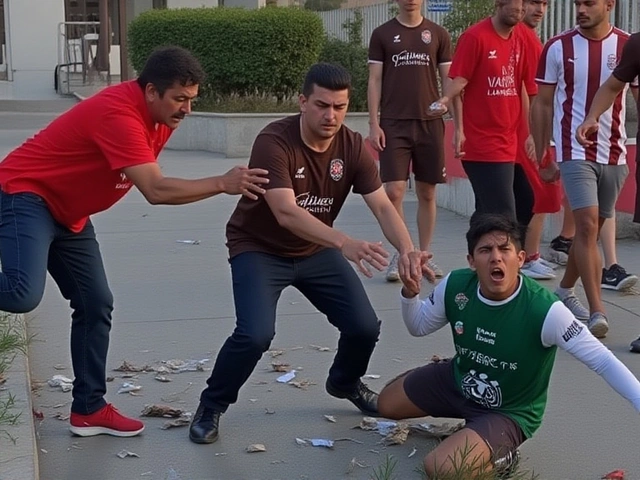When Club Tijuana Xoloitzcuintles faced Club León at Estadio Caliente on , a chaotic brawl erupted outside the gate, leaving five fans hurt and prompting the Mexican Football Federation (FMF) to levy a fine and suspend the Xolos’ notorious supporters group.
What sparked the melee?
The trouble began before kickoff, when members of the organized fan faction La Masakr3 deliberately blocked the main entrance and charged at a wave of León supporters trying to enter. Witnesses say the Xolos fans formed a tight cordon, shouting insults and brandishing makeshift weapons. The sudden ambush triggered a cascade of punches, kicks and shoving that spilled into the concourse.
One video, widely shared on social media, shows a masked assailant delivering a straight kick to a León fan’s face while the latter is on his knees. The attacker slipped away just as police finally arrived, leaving the victim bloodied and dazed. According to Francisco, a 28‑year‑old journalist who covers cross‑border soccer, “the police did not arrive immediately on the scene, unfortunately, as some real acts of violence were seen, and some of the culprits were not apprehended by the proper authorities.”
Security missteps and delayed police response
Stadium staff made a critical error by shutting one of the main gates amid the chaos, trapping by‑standers who were not involved in the fight. The closure caused a bottleneck, intensifying panic and making it harder for emergency services to reach the injured. By the time officers from the Baja California Prosecutor’s Office secured the perimeter, several perpetrators – including the masked kicker – had already melted into the crowd.
Authorities later admitted that the response lag was partly due to communication breakdowns between the venue’s private security team and municipal police. The FMF cited these lapses in its disciplinary report, noting that proper protocol would have required immediate lockdown of all access points and rapid deployment of crowd‑control units.
Sanctions handed down by the FMF
On , the FMF’s disciplinary committee announced its verdict. While the exact monetary amount remains undisclosed, the federation imposed a financial penalty on Club Tijuana Xoloitzcuintles and issued a formal ban on La Masakr3. The ban covers at least three home matches, with the possibility of extension if further incidents occur.
In addition, the FMF warned that any repeat offenses could trigger harsher measures, such as point deductions or stadium closures. The federation also pledged to review video evidence more thoroughly and to work with Liga MX in expanding the Fan ID system, a biometric ticketing tool that could help identify masked individuals in future incidents.
Why this matters: the broader fight against fan violence
Fan violence has plagued Mexican football for decades, but the Xolos‑León clash stands out because it erupted during a high‑stakes league fixture – the final home game of the 2023 Clausura season for Tijuana. The incident underscores how rivalries, when coupled with inadequate security, can quickly spiral into public disorder.
Experts say the episode could accelerate Liga MX’s push for stricter crowd‑control regulations. Dr. Mariana Torres, a sports‑sociology professor at the Universidad Autónoma de Baja California, notes, “These sanctions signal that the federation is finally moving from punitive after‑the‑fact measures to preventive strategies, such as mandatory Fan ID verification and increased police presence at high‑risk matches.”
For the average fan, the fallout means fewer seats available for their favorite supporters’ section, higher ticket prices to cover security upgrades, and a possible shift in how clubs engage with their most passionate – and sometimes volatile – followings.
What’s next for Club Tijuana and La Masakr3?
The club’s management issued a brief statement expressing regret over the “unacceptable behavior” and pledging cooperation with investigators. They also announced plans to launch an internal education program aimed at de‑escalating tensions among supporter groups.
Meanwhile, La Masakr3’s leadership has not publicly responded, but insiders hint that the group may appeal the ban, arguing that the sanction unfairly punishes the entire fanbase for the actions of a few. Whether an appeal will succeed remains uncertain, especially as the FMF’s disciplinary panel stresses a zero‑tolerance policy.
Looking ahead, the next home match for the Xolos – scheduled for early May against Atlas – will be closely monitored. Security officials have confirmed that all stadium entrances will remain fully operational, with additional metal detectors and a larger contingent of uniformed officers on site.
Key facts
- Date of clash:
- Venue: Estadio Caliente, Tijuana, Baja California
- Injured fans: 5 (confirmed)
- Sanction announcement: by the Mexican Football Federation
- Ban: La Masakr3 suspended for a minimum of three home games
Frequently Asked Questions
How does the ban affect Club Tijuana’s upcoming matches?
The ban means La Masakr3 members cannot purchase tickets for at least the next three home fixtures. The club must also allocate additional security resources, which could raise ticket costs for other fans.
What led to the violent confrontation?
The clash began when La Masakr3 deliberately blocked a stadium gate and assaulted León supporters entering the venue. Mishandling by stadium staff, who closed the gate, amplified the chaos.
Will the Fan ID system help prevent similar incidents?
Fans now must present a biometric‑linked ID to enter Liga MX stadiums. Proponents argue it deters masked aggression, while critics warn it could infringe on privacy if not managed carefully.
What legal actions are being taken against the perpetrators?
The Baja California Prosecutor’s Office opened a criminal investigation. So far, a few arrests have been made, but the masked assailant who kicked a León fan remains at large.
How common is fan violence in Liga MX?
While most matches proceed without incident, clashes between groups like La Masakr3 and rival ultras occur several times each season, prompting the league to tighten security protocols.
